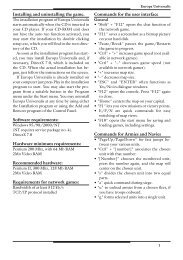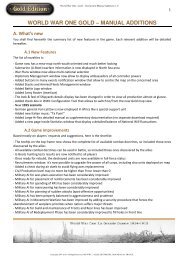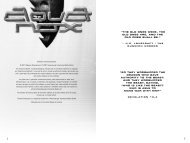You also want an ePaper? Increase the reach of your titles
YUMPU automatically turns print PDFs into web optimized ePapers that Google loves.
6. Diplomatic Poker Option<br />
If Germany has chosen this option (whatever the plan), the chain reaction<br />
of nations is undertaken before the Ultimatum to Belgium (if any).<br />
7. Ultimatum to Belgium<br />
If Germany has chosen the Schlieffen Plan, it may wish to force its way into<br />
Belgium, and thus must first present the latter an ultimatum, hoping for the<br />
grant of a right of passage. A Diplomatic Test takes place, and if the right<br />
of passage is not given (usually when Belgian level is not 8+), Germany<br />
declares war on Belgium. In such a case, the US level goes down by 1<br />
(pro-Entente).<br />
Alternatively, with the Rupprecht Warplan, Germany may declare war on<br />
Switzerland (but in that case, the ultimatum is always considered to be<br />
refused).<br />
If Germany does nothing against Belgium (warplans other than Schlieffen),<br />
France may then do the same and address an ultimatum to Belgium.<br />
8. Great Britain’s Reaction<br />
If Belgium is attacked by Germany, the British level may immediately (and<br />
strongly) go down. The same test is done, with reversed effects if France<br />
attacks Belgium.<br />
An immediate Great Britain Diplomatic Test occurs, and her level is<br />
adjusted again, with the result now applying.<br />
● If Great Britain enters the war or goes to limited intervention, the<br />
Entente player receives 1 extra British AMB. In both cases, British<br />
mobilization takes place, and the BEF is debarked at the end of the<br />
Entente’s Military Phase, in August 14.<br />
17. Diplomacy<br />
Diplomacy is an important factor in the outcome of World War One, and it<br />
is directed toward neutral major powers, and minor countries still out of the<br />
war. The Appendices give complete information about the major and minor<br />
countries.<br />
Diplomacy takes place every turn, including the particularly active<br />
diplomatic phase of August 1914. The objective of diplomacy in this game<br />
is to ensure that the greatest number of initially neutral nations will join<br />
the player’s camp. It may involve some active participation (including<br />
declaration of war to the player’s enemies) but will usually result in<br />
obtaining a wide range of useful benefits (see 2 below).<br />
Each side may attempt 1 diplomatic action on one neutral country of<br />
his choice (i.e. it means there are at most two countries tested for<br />
diplomacy each turn). To do so, a friendly Ambassador should be present<br />
(one with a non-zero value; zero value ambassadors are used as decoys).<br />
A diplomatic test is made, where all the values of all friendly Ambassadors<br />
● If Great Britain is at war, the United States diplomatic level goes down<br />
by 1.<br />
9. Chain Reaction of European countries<br />
Certain key minor European countries are tested, in this order, even if no<br />
player has placed any AMB there. Results as per section 19 below.<br />
● Italy’s Reaction: Italy’s Diplomatic Test automatically takes place.<br />
● Romania’s Reaction: Romania’s level is determined randomly<br />
(between 0 and 7). Then Romania’s Diplomatic Test takes<br />
place.<br />
● Bulgaria’s Reaction: Bulgaria’s Diplomatic Test takes place<br />
automatically.<br />
● Greece’s Reaction: Greece’s Diplomatic Test automatically takes<br />
place.<br />
● Turkey’s Reaction: Turkey’s Diplomatic Test automatically takes place.<br />
16.5 Preliminary Moves and Mandatory Offensives<br />
Armies identified on the map with a RED FLAG have the obligation to make<br />
a preliminary attack (because of the warplan in place). Therefore in the<br />
1914 Mandatory attack phase, those units must be move towards an area<br />
with enemy units.<br />
16.6 Various<br />
Once the initial phases above (including the mandatory attacks) are<br />
completed, a “normal” turn takes place, starting with the Military Phase.<br />
The movement and attacks are handled as per the normal rules.<br />
are added together, and where the sum of the values of all enemy<br />
Ambassadors is deducted, giving a bonus or a penalty. The test result<br />
indicates either there is no effect, or there is a change in the neutral<br />
country diplomatic level (which is indicated by steps in various diplomatic<br />
levels/thresholds).<br />
According to the level that has been reached by the player’s alliance; the<br />
neutral nation may change its behaviour. The results and effects are<br />
indicated directly inside the information window.<br />
If a neutral nation declares war, it may have consequences (often adverse<br />
ones) on some other neutral nations (which is particularly the case in the<br />
Balkans or between Italy and Turkey).<br />
The Diplomatic Map<br />
The diplomatic map filter (the diplomat button just on top on the minimap)<br />
will show the game map in diplomatic mode. This mode displays all your<br />
World War One: La Grande Guerre 1914-1918 87
















